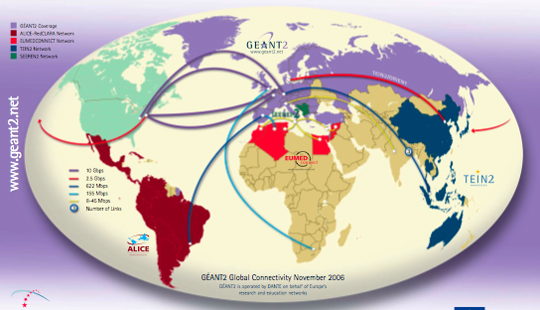The theme of the recent AAAS meeting was science gone global. Talks focused how international collaborations have become the norm in physics and biology and how developing a scientific and technically literate community can help provide a foundation for developing economies. Unfortunately, scientists in the developing world face a number of barriers, including lack of equipment and materials to conduct research and a shortage of access to the latest scientific data and publications.
Given that most scientific information that isn't sitting in a shipping crate at Google is available on a network somewhere, this problem boils down to network building: get the developing countries a sufficiently high-speed link to the US, Europe, and the developed nations in Asia, and data and publications should be accessible. There's been a steady stream of progress in that area that has been announced by the European network provider DANTE, and the AAAS meeting provides a good opportunity for an overview of these efforts.

Global scientific networks get serious bandwidth
DANTE, like Internet2 in the US, acts as a specialized networking provider for academic institutions. It buys capacity on high-speed fiber networks and dedicates that to connecting regional networks at high speed; in Europe, those regional networks wind up being national. They're termed NRENs, for National Research and Education Network. Dante has also linked the European network to the US and other regional network providers, and is exporting the NREN model to Latin America and Asia.
The new announcements are all about expanding the reach of these high-speed academic networks. Back in February, DANTE announced the initial work on Tein3, the creatively named successor to their Tein2 Asian network. The network serves scientific heavy-hitters like Australia, China, Japan, and Korea, but it also brings in the developing world, including Indonesia, Laos, Malaysia, the Philippines, Thailand, and Vietnam. In announcing Tein3, they also noted that expanding to other countries was under consideration.
At the end of January, the location was Africa. Here, the NRENs of Kenya, Malawi, Mozambique, Rwanda, and South Africa had already responded to the growth of fiber networks on the continent to establish their own regional network, UbuntuNet. Sudan, Tanzania, Uganda, and Zambia were added at a later date, and the alliance is open to any African nation that's organized an NREN. The news in January was the building of a dedicated 1Gbps link between UbuntuNet and Europe. "The UbuntuNet Alliance’s vision is to ensure that Africa can participate effectively in the global research community with all involved reaping the benefits of closer international collaboration," said UbuntuNet's CEO in a statement. "This new high speed link with the global research and education network... provides the bandwidth to realize our ambitions."
Finally, this week sees the launching of a Black Sea Interconnection initiative. Organized by the Turkish NREN, the new network will connect Armenia, Azerbaijan, and Georgia with both Turkey and Europe. Bit by bit, the academic world is coming online.
These networks have the potential to foster international collaboration in significant ways. The first is scientific. These networks give developing nations access to the global scientific network, and that connection can work both ways. Many of these nations contain ideal sites for research, such as biodiversity hotspots, unique geological features, or propitious sites for observatories. With a connection to the outside world, science may come to them in the form of collaborations with researchers that can work on-site without leaving the larger scientific community behind.
The second thing is that the collaborations these networks enable are a form of diplomacy. To say that Turkey, Armenia, and Azerbaijan haven't always gotten along very well is a bit of an understatement, but their citizens will be working together and coordinating the operation of this new network. Even if their national governments aren't always on good terms, informal relations can be an important form of diplomacy, and one that scientific cooperation has a proven track record in.
reader comments